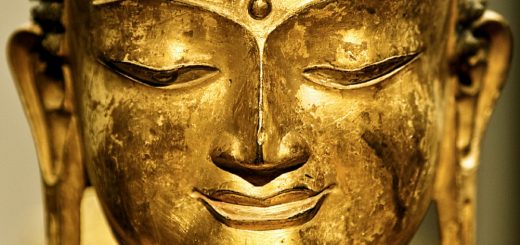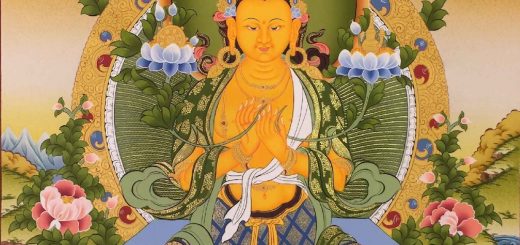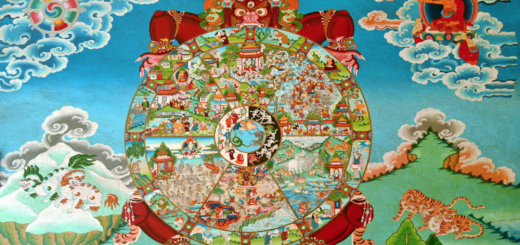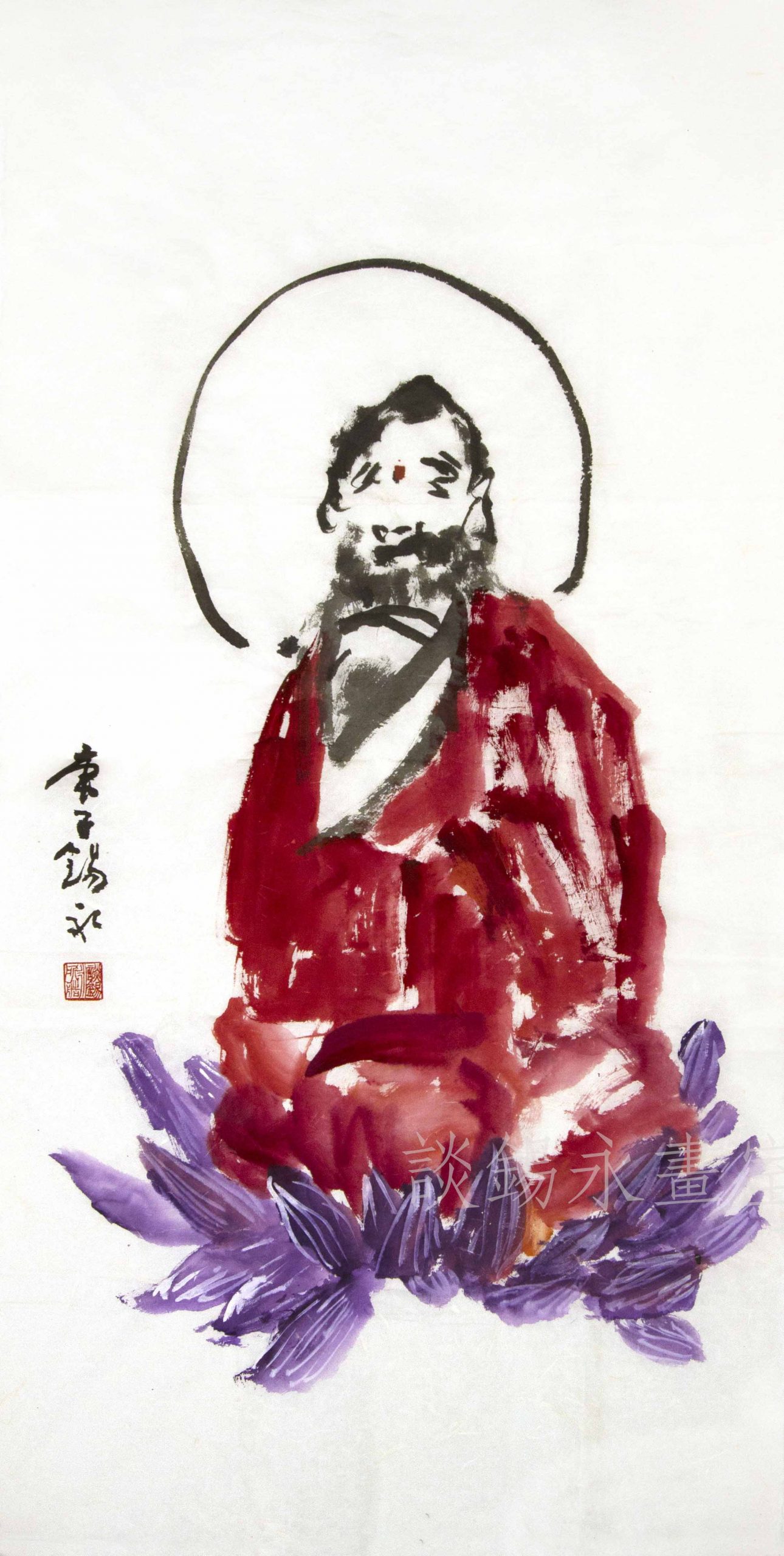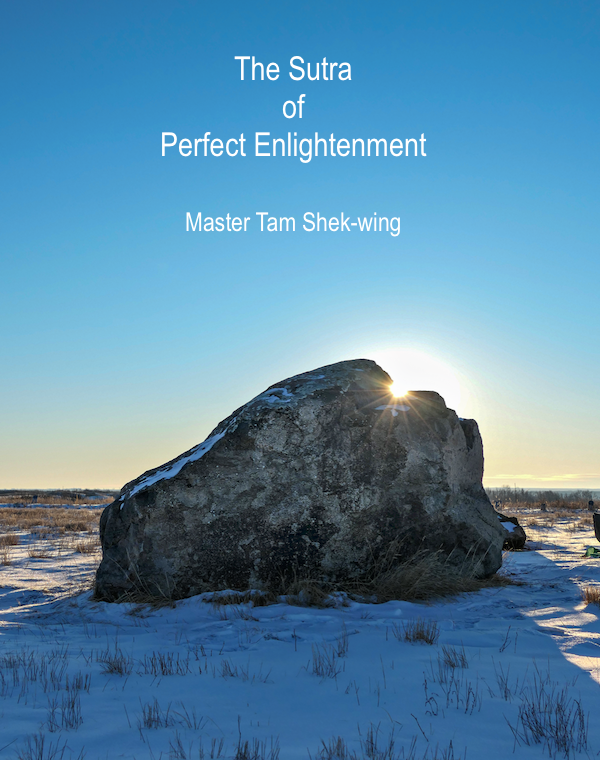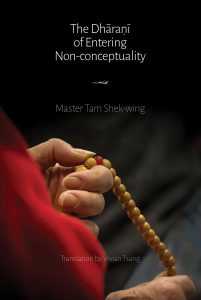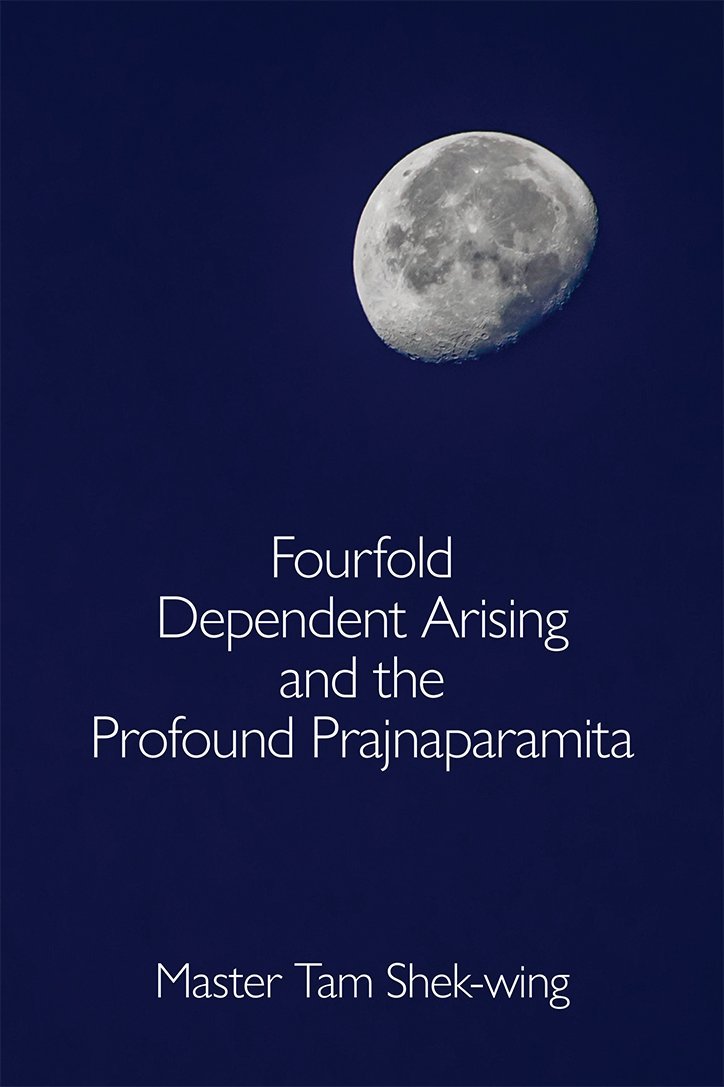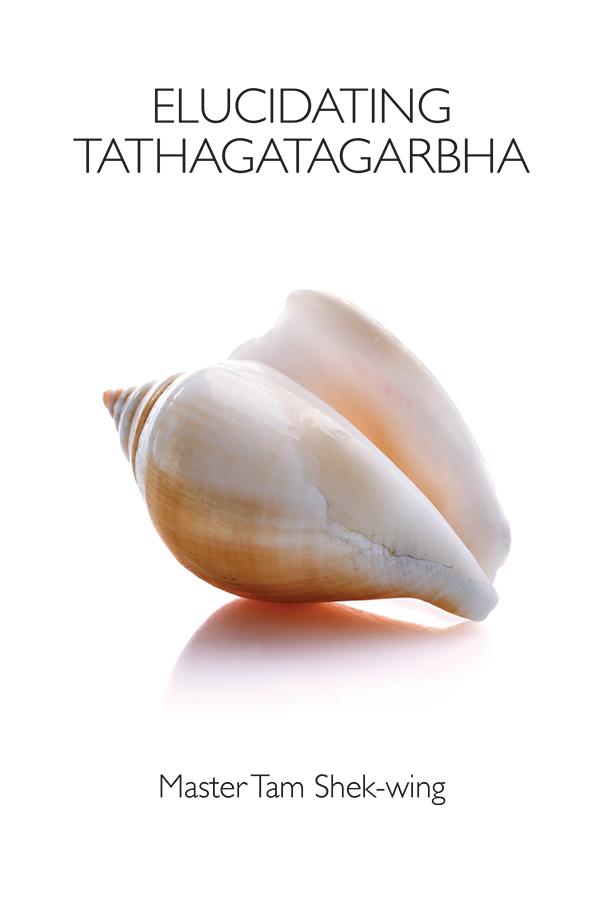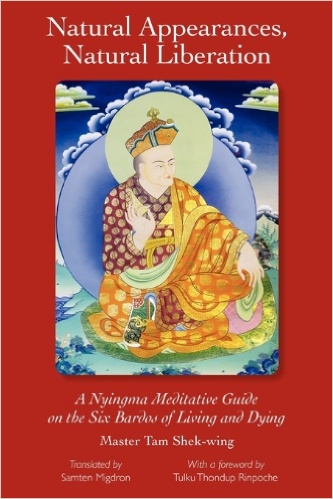Perfect Enlightenment 17: Severing the Root of Saṃsāra
In the previous column, bodhisattva Maitreya asks Buddha the way to sever the root of samsara (cyclical existence). Previously, bodhisattva Vajragarbha’s questions led to the conclusion that it is the cyclical perspective that obscures awareness (and thus, wisdom), thereby leading to suffering. How, then, can one sever oneself from the root of samsara? Maitreya asks by way of three questions:
1. How many types of beings are there?
2. What are the different practices to enlightenment?
3. What are the ways to guide sentient beings towards enlightenment?
Click here for the table of contents to revisit the dialogue between Buddha and previous bodhisattvas.
Show scripture (Chinese). 爾時,世尊告彌勒菩薩言:「善哉!善哉!善男子!汝等乃能為諸菩薩及末世眾生,請問如來深奧祕密微妙之義,令諸菩薩潔清慧目,及令一切末世眾生永斷輪迴,心悟實相具無生忍。汝今諦聽!當為汝說。」時,彌勒菩薩奉教歡喜,及諸大眾默然而聽。 「善男子!一切眾生從無始際,由有種種恩愛、貪欲故有輪迴。若諸世界一切種性,卵生、胎生、濕生、化生,皆因婬欲而正性命,當知輪迴愛為根本。由有諸欲,助發愛性,是故能令生死相續。欲因愛生,命因欲有,眾生愛命還依欲本;愛欲為因,愛命為果。由於欲境起諸違順,境背愛心而生憎、嫉,造種種業,是故復生地獄、餓鬼;知欲可厭,愛厭業道,捨惡樂善,復現天、人;又知諸愛可厭惡故,棄愛樂捨,還滋愛本,便現有為增上善果,皆輪迴故,不成聖道。是故眾生欲脫生死免諸輪迴,先斷貪欲及除愛渴。 「善男子!菩薩變化示現世間非愛為本,但以慈悲令彼捨愛,假諸貪欲而入生死。若諸末世一切眾生能捨諸欲,及除憎愛永斷輪迴,勤求如來圓覺境界,於清淨心便得開悟。 「善男子!一切眾生由本貪欲,發揮無明顯出五性,差別不等;依二種障,而現深淺。云何二障?一者理障礙正知見,二者事障續諸生死。云何五性?善男子!若此二障未得斷滅名未成佛;若諸眾生永捨貪欲,先除事障未斷理障,但能悟入聲聞、緣覺,未能顯住菩薩境界。善男子!若諸末世一切眾生,欲泛如來大圓覺海,先當發願勤斷二障,二障已伏即能悟入菩薩境界;若事、理障已永斷滅即入如來微妙圓覺,滿足菩提及大涅槃。善男子!一切眾生皆證圓覺,逢善知識依彼所作因地法行,爾時修習便有頓漸;若遇如來無上菩提正修行路,根無大小皆成佛果;若諸眾生雖求善友遇邪見者,未得正悟,是則名為外道種性,邪師過謬,非眾生咎。是名眾生五性差別。 「善男子!菩薩唯以大悲方便入諸世間開發未悟,乃至示現種種形相逆順境界,與其同事化令成佛,皆依無始清淨願力。若諸末世一切眾生於大圓覺起增上心,當發菩薩清淨大願,應作是言:『願我今者住佛圓覺,求善知識莫值外道及與二乘。』依願修行,漸斷諸障,障盡願滿,便登解脫清淨法殿,證大圓覺妙莊嚴域。」 Show scripture (English). Then the World Honoured One, addressing the Bodhisattva Maitreya, said: “Excellent, excellent! Good son, you have questioned well on behalf of the bodhisattvas and sentient beings of the degenerate age about the Tathāgata’s mysterious, secret, subtle doctrine. You have enabled the Bodhisattvas to purify their Wisdom Eye, and allowed all sentient beings of the degenerate age to permanently sever themselves from cyclic existence. Their minds will awaken to their true characteristic and they will possess the equipoise that comes with the awareness of the non-arising characteristic of existence. Now listen well, and I shall explain this for you.” Maitreya received this instruction with joy and great reverence. All those in the great assembly became silent and listened. “Good sons, all sentient beings transmigrate because of their possession, from beginningless time, of affection, attached love, craving and desire.” “Since all the different types of beings—those born from eggs, those born from wombs, those born from moisture and those born by transformation all receive their birth and life from sexual desire, you should realize that cyclic existence has attached love as its basis. This tendency to be gripped by attached love is abetted by the existence of all desires, therefore it is able to empower the continuity of saṃsāra. Desire arises depending upon attached love; life force exists depending upon desire. Furthermore, the attached love and life of sentient beings have desire as their root. Attached love and desire are causes, attached love and life are results.” “It is in reference to the objects of desire that you arise all likes and dislikes. When the object is contrary to the attached mind, you arise aversion and jealousy and go around creating all sorts of karma. It is because of this that you are reborn as a hell-being or a hungry ghost. But then, knowing that desire should be abandoned and attaching to the path of abandonment of karmic activity, you cast off evil and enjoy goodness; hence, you are reborn as a god or man. Again, knowing that you should dislike all forms of attachment, you let go of attachment and enjoy detachment. This greatly nourishes the root of attachment and you automatically produce conditionally enhanced positive states. But since all of this is cyclic existence, you still do not attain to the sagely way. Therefore, sentient beings who desire to be free from birth and death and want to escape cyclic existence, first have to sever desire and rid themselves of attached love.” “Good sons, when bodhisattvas appear in the world to teach, it is not based on attachment. It is only their compassionate intention to have the sentient beings discard attachment that they provisionally take on all kinds of desire and enter birth-and-death.” “If all sentient beings of the degenerate age can cast off their desires and remove love and hate, they will permanently end their cyclic existence. Seeking the perfectly enlightened state of the Tathāgata in their pure minds, they will directly attain awakening.” “Good sons, sentient beings, because of their base of desire, generate ignorance and manifest the distinctions and inequalities of the Five Natures. Because of the Two Hindrances there is manifestation of deep and shallow. What are the Two Hindrances? The first is the noumenal hindrance which obstructs correct awareness; the second is the phenomenal hindrance which enables the continuation of saṃsāra.” “What are the Five Natures? Good sons, if sentient beings have not yet been able to destroy the Two Hindrances, this is called non-consummation of one’s Buddhahood. If sentient beings permanently discard desire, first removing the phenomenal hindrance, but not yet severing the noumenal hindrance, they are able to awaken in the way of direct disciples and solitary realizers but are not able to manifest and dwell in the state of the bodhisattva.” “Good sons, if all sentient beings of the degenerate age desire to float on the great ocean of the Tathāgata’s Perfect Enlightenment, they should first arouse the determination to do away with the Two Hindrances. Once the Two Hindrances are subdued, one can awaken and enter the state of the bodhisattva; after permanently destroying the noumenal and phenomenal hindrances, one is able to enter the sublime Perfect Enlightenment of the Tathāgata, and able to fully accomplish bodhi and great nirvana.” “Good sons, all sentient beings without exception actualize Perfect Enlightenment.” “When you meet a Genuine Teacher, rely on the reality-practice of the causal stage that he sets up for you. When you follow this practice, both sudden and gradual will be contained. If you come upon the correct path of practice of the unsurpassed bodhi of the Tathāgatas, then there are no superior or inferior abilities of people: all accomplish Buddhahood. If, while seeking a Genuine Teacher, sentient beings meet one with mistaken views, they will not gain the correct awakening. Although this is called the heterodox nature, the mistake is the fault of the teacher, and not that of the sentient beings. This is the distinction of the five natures of sentient beings.” “Good sons, it is only through their Greatly Compassionate expedient means that bodhisattvas enter the secular world, awakening the unenlightened, manifesting various forms and shapes, functioning in agreeable and disagreeable circumstances. It is only relying on the beginningless pure power of their vow to save all beings that they physically work together with these people and cause them to accomplish Buddhahood. Any sentient being of the degenerate age who would arouse the mind intensified toward great Perfect Enlightenment, must arouse the pure great determination of the bodhisattvas. He should say ‘I hereby vow to dwell in the Perfect Enlightenment of the Buddha, to seek Genuine Teachers and not to plant roots with heterodox paths or practitioners of the Two Vehicles.’ Practicing based on this vow, you sever the hindrances one by one. When the hindrances are gone, the vow is fulfilled. You will automatically ascend to the Pure Dharma Palace of Liberation, and actualize the marvelously adorned realm of Great Perfect Enlightenment.” Buddha began by praising Maitreya for having “questioned well on behalf of the bodhisattvas and sentient beings of the degenerate age about the Tathāgata’s mysterious, secret, subtle doctrine,” to allow all sentient beings of the degenerate age 1. “to permanently sever themselves from cyclic existence”; 2. “their minds will awaken to their true characteristic” and 3. “they will possess the equipoise that comes with the awareness of the non-arising characteristic of existence.” The three are the fruition from practicing the Tathāgata’s mysterious, secret, subtle doctrine. The answers that follow will also based upon this meaning of fruition. Buddha's answer to the first question... click to show more. Buddha first answered the question on the root of cyclical existence. It is “because of their possession, from beginningless time, of affection, attached love, craving and desire.” Consider the four types of beings, they “all receive their birth and life from sexual desire” (in contrast to in-vitro fertilization), or in other words, “cyclic existence has attached love as its basis.” Because of “this tendency to be gripped by attached love is abetted by the existence of all desires,” the root of saṃsāra has “attached love and desire [as] causes, attached love and life [as] results.” With such causes and results, there are three types of cyclical existences. With the arising of aversion and jealousy, one is reborn in the lower three realms (hell-beings or hungry ghosts); “knowing that desire should be abandoned and attaching to the path of abandonment of karmic activity,” one is reborn in the higher three realms (gods or humans); “knowing that you should dislike all forms of attachment, you let go of attachment and enjoy detachment… produce[s] conditionally enhanced positive states.” None of the three cyclical existences are the sagely way because they are all limited by desire and attached love. Regarding the last kind (“conditionally enhanced positive states”), this kind “let go attachment and enjoy detachment,” which is the four dhyāna practices and the eight samādhi (四禪八定) to let go of attachments and desires. However, one has yet to become free. By letting go of the unrefined body, it becomes the subtle body; by letting go of the unrefined mind, it becomes the subtle mind. However, there still exists the limitation of body and mind. This way is not yet the unconditioned and the sagely way to liberation. This concludes the first answer. Buddha's answer to the second question... click to show more. The second question is on the different kinds of beings. We begin with bodhisattvas. They appear in the world not because of attachments. They only intend to have the sentient beings discard attachment that they provisionally take on all kinds of desire and enter the cycle of birth-and-death. In Avatamsaka Sūtra, Sudhana’s journey to visit fifty-three “good friends” describes various bodhisattvas’ appearances of greed, envy, and ignorance, these are acts of compassion compelling sentient beings to discard their attachments. To distinguish the differences in the practice of perfect awareness, one begins with knowing the different kinds of beings. Beings are of Five Natures: ordinary beings, the two vehicles of Śrāvakas and Pratyekabuddhas, bodhisattvas, undetermined, and outsiders (non-Buddhists). They all possess Two Hinderances, the difference is only a matter of degree. The Two Hinderances are noumenal and phenomenal hinderances. The former obstructs the correct view, the latter is what enables the continuation of the cycle of life and death. Buddha describes the Five Natures from the Two Hinderances: Given the Five Natures, the practice manifests the five differences. But since even ordinary beings and outsiders without exception will realize perfect enlightenment, Buddha referred to them as the vehicle of humans and heavens. Ordinary beings yearn for good fortune, they are thus called the vehicle of humans; outsiders yearn for the divine, they are thus called the vehicle of heavens. Buddhists are warned not to be arrogant and boastful, for all beings without exception will accomplish Buddhahood realizing perfect enlightenment. The above concludes the second answer. Buddha's answer to the third question... click to show more. The answer to the third question. How many expedient devices are there to awaken the unenlightened? Buddha only spoke of one: to arouse them into the bodhisattva’s way, such that their nature becomes undetermined, such that they do not fall into the way of Śrāvakas and Pratyekabuddhas, nor into the way of outsiders. Beings of five natures ultimately enter into the bodhisattva’s way. This way, “bodhisattvas enter the secular world, awakening the unenlightened,” which is the expedient means. Yet, how does one enter the secular world? This is to manifest “various forms and shapes, functioning in agreeable and disagreeable circumstances. It is only relying on the beginningless pure power of their vow to save all beings that they physically work together with these people and cause them to accomplish Buddhahood.” This is the expedient means to enter the secular world. For all sentient beings, they arouse the pure great determination of bodhisattvas, vowing to follow the Great Teachers, not plant roots with the practices of outsiders and the two vehicles. “Practicing based on this vow, you sever the hindrances one by one. When the hindrances are gone, the vow is fulfilled. You will automatically ascend to the Pure Dharma Palace of Liberation, and actualize the marvelously adorned realm of Great Perfect Enlightenment.” This is the expedient means for beings in the degenerate age. The above concludes the third answer. Stanza to conclude the section... click to show scripture (Chinese). 爾時,世尊欲重宣此義而說偈言: 彌勒汝當知, 一切諸眾生, Show scripture (English). Then the World Honoured One, wanting to restate the gist of this, spoke a verse; he said: Maitreya, you should know The verse re-emphasizes the root of saṃsāra lies in greed and desire; desire is rooted in likes and dislikes, giving rise to hatred and ignorance. One should strive to eliminate greed and attachments, and by “eliminating,” it is a transcendence via various expedient means, where lies the differences of Five Natures. Among them, the bodhisattva’s way is considered the superior way. Relying on the power of the Greatly Compassionate Vow, one enters the secular world of life and death to attain perfect enlightenment.Chinese:
English:
Commentary:
Chinese:
不得大解脫, 皆由貪欲故,
墮落於生死。 若能斷憎愛,
及與貪瞋癡, 不因差別性,
皆得成佛道。 二障永銷滅,
求師得正悟, 隨順菩提願,
依止大涅槃。 十方諸菩薩,
皆以大悲願, 示現入生死。
現在修行者, 及末世眾生,
勤斷諸愛見, 便歸大圓覺。English:
That the non-attainment of great liberation
By all sentient beings
Is only due to desire;
Therefore they are drawn into birth and death.
If you can separate yourself from like and dislike,
As well as desire, hatred and ignorance
You will all perfect the Buddha’s way
And permanently destroy the Two Hindrances,
Without needing any distinctions in nature.
Seek a teacher who has the correct awakening
Practice the vow to arouse the bodhi-mind
Rely on Great Nirvāṇa.
The bodhisattvas in the ten directions
All appear in the world of saṃsāra
Relying on the Greatly Compassionate vow.
Present practitioners
As well as sentient beings of the degenerate age
Should strive to eliminate all attached views
And directly return to Great Perfect Enlightenment.Commentary:
